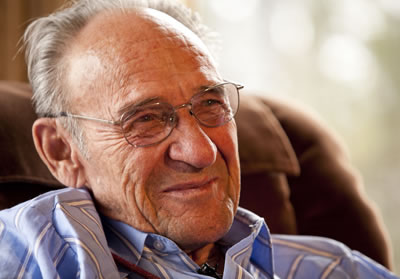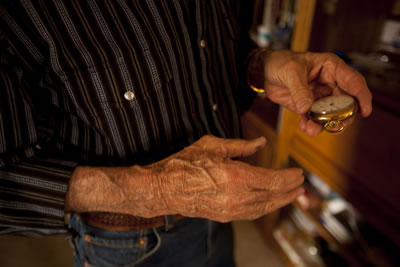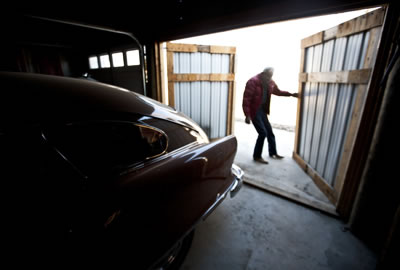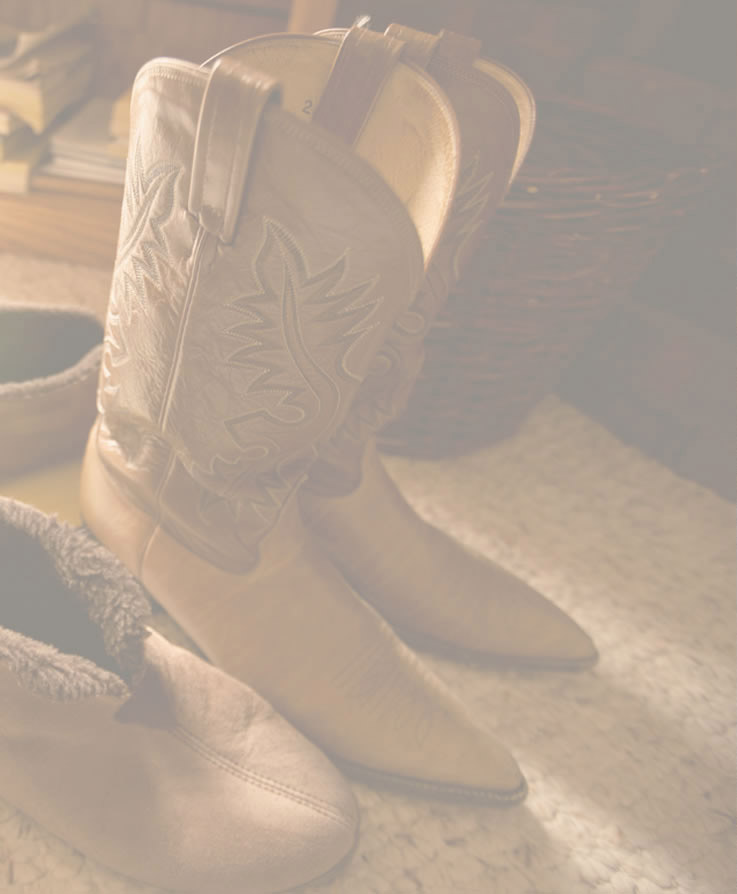Failure & fortune on the frontier
By Lily Rabil
Photos & Multimedia by Shane Bell
He stood in shock next to the combine on top of the hill. He felt the dread welling up in his chest, but he didn't cry. Willard "Bud" LaCounte rarely cries. The field was ruined. One hundred acres of wheat flattened during the night by an early September hail. They would have to go without that year. They lost $6,000 that night and he knew they'd have to sacrifice something.
Bud composed himself and turned back down the hill on his farm near Bainville in Montana's northeast corner. Venice LaCounte, his wife, was driving up the dirt road in their truck. It could haul 350 bushels of grain and she was expecting to fill it up.
He knew he'd have to tell her. And he knew how much it was going to hurt. He braced himself and went to meet her. It was still early in the morning and they had more work to do. This couldn't stop them.

"Well, I'm proud of my family; they've done good," Bud LaCounte says with a smile. "But I'm also very proud of the accomplishments we've done, building ourselves up the way we have."
He explained what happened, that the golden wheat that stood two feet high across the field just yesterday was reduced to a muddy mess during the night. Venice just cried. They'd have to rely on the milk cows for extra money.
Bud assured her it would be all right. He knew they'd get through it. This, like every other tragedy in their lives, would pass and things would get better.
On a recent spring afternoon, Bud rocks slowly in his recliner in his home in Billings, remembering the worst day on the farm. It takes him a minute to recall the details; he's not one to dwell on the negative. He prefers to remember good days and good harvests.
The LaCounte family has been through many hardships since their Chippewa ancestors were forced onto the tiny Turtle Mountain Reservation in northern North Dakota in 1882. After the 1887 Dawes Act gave enrolled tribal members 160 acres each, with the intent of making them into farmers and phasing out the reservations, Turtle Mountain could accommodate only a fraction of the enrolled members. Several Chippewa families, including the LaCountes, got allotments in eastern Montana after white settlers had laid claim to land they wanted.
"I don't think the experiment worked because I was born an India in 1923, which makes me 87 today, and I'm still an Indian."
Bud LaCounte
Bud's mother and father had 160 acres each but the landscape was harsh and the climate brutal. Farming was out of the question for his mother. She had her hands full trying to keep the family of nine children alive. His father was caught trying to steal horses and was sent to prison.
It would take Bud years to make something of his mother's land. Conditions were harsh for farmers on the Great Plains, Indians and immigrants alike. An arid climate, subzero winters and rocky soil spoiled many dreams. Compounding that, for nomadic Indian tribes, there was no farming tradition.
Bud isn't sure how he managed to succeed, to take a 160-acre allotment and turn it into an extensive and successful farming and ranching operation, where others, including his mother and father, failed. "I just guessed," he says. "Sometimes you miss, sometimes you don't."
But more than guessing, it took hard work, the sweat of a whole family.
He likes to remember a time when the farm was green and cattle milled around the crowded feed yard. A time when his oldest child, Larry, still wanted to be a cowboy. When his older daughter, Linda, still followed her mom around the kitchen while his younger daughter, Cynthia, hung onto the fence, taking in every move her father made.

Bud LaCounte found a pocket watch on a railroad tracks near the Fort Peck Reservation more than 70 years ago when he was 16. The watch has travelled with Bud from the beaches of Normandy to the fields of his ranch in Bainville.
Bud grins as he points to a notepad on the floor. The gold fillings in his teeth catch the sunlight pouring in through the window. He's writing a book, he says, his history. Bud never liked to talk much about himself, but Larry says he's opened up in the last year. Bud's right hand shakes a little as he points to the floor. His fingers are long and gnarled. His veins stick up beneath his skin and run like snakes up his hands, disappearing beneath the cuff of his striped blue button-down shirt.
He's a cowboy, though without the hat. He says he got tired of chasing after it after forgetting it on the tractor, in the car, in the house or with the neighbors. Other than that, not much has changed since he retired.
Bud started the farm by renting, and later buying, the allotted 160 acres from his mother. It was his way of supporting her. The operation was small and mostly run by the family. Over the next few years, Bud was able to save up enough money to purchase a neighboring allotment. Larry says his parents were thrifty and cautious not to overspend on indulgences.
After that, Bud added another 160 acres to the farm, and from there, things moved quickly. He bought 440 more acres and paid for them in crops until he met the purchase price of $18,000. Then he stopped milking cows and started raising cattle. He expanded his crop fields and hired a few people to help out as needed.The farm grew from a few hundred acres, to more than 2,000 by 1973.
By the time he retired and moved to Billings in the late 1980s, land that once sold for $40 an acre was worth $200 an acre.
He sold most of the land when he retired, along with the cattle and the machinery. If anybody is going to farm the land, they're going to have to start from scratch, like Bud and Venice did.

Even though he has retired from working on the farm, Bud LaCounte only wears cowboy boots. He has seven in his collection, all scattered around his home at any time. This pair is one of his favorites and the pair he wears out dancing with his friends on the weekends.
Most of his memories are with Venice. They were married for 67 years and three days. When she died, something in Bud died too.
They were driving back from Branson, Mo., where they'd gone to celebrate their anniversary. Her health had turned and they knew she didn't have long to live. She was sitting next to him in the car, arguing with him about her medication. It was making her hair fall out and she wanted to stop taking it.
Bud told her it was keeping her alive and under no circumstances would she stop. He made her promise to call the doctor when they got home.
She promised.
Minutes later she was dead. She collapsed in the passenger seat of their Mercury Marquis. "If she would have had any life left, anything, she would have looked up at me for help," says Bud, "but she couldn't even look at me."
About a week after her death, Bud was taking the car through the wash. Surrounded by darkness, he glanced over at her seat and saw her sitting there. He drove from the car wash to the nearest dealership and bought a new Mercury Marquis in another color. The car is the only thing that's changed since Venice died.
He stares at a painting of the farm on the opposite wall. The painting hasn't been moved in years, and it never will be if Bud has anything to say about it. Behind his glasses, his eyes begin to water, but he purses his lips and rocks a little faster in the chair. His cowboy boots squeak as he rocks back and forth in his overstuffed tan recliner.

Bud LaCounte sits in his favorite recliner chair next to the mantle where a portrait of Venice LaCounte, the woman to whom he was married for 67 years and three days, is displayed. Below it rests an urn containing her ashes.
"Sometimes I can still see her crossing the yard," he says, pointing at the painting. His voice shakes as he lets her memory wash over him. He places both hands on the side of his chair and stands. He turns from the painting and looks around the living room.
"This is an awful lot of space for a bachelor," he says. The room is silent but he doesn't notice. His mind is 20 years away, still on the farm in Bainville.
Bud was born near Bainville. Family life is sort of a blur because he spent most of his young life in and out of Indian boarding schools. When he was 6, he says a Bureau of Indian Affairs agent came to take him away to Fort Totten School in North Dakota. It was the same school they took his mother to so many years before.
"They gathered up a lot of little Indian kids like us, trying to make white folks out of us I guess," Bud says, shrugging.
The boarding schools were set up across the United States. They were designed to take the Indian out of the Indians, to educate them in trades that would help make them self-sufficient. The children were separated by gender. Their hair was cut and they were whipped if they misbehaved. Many children, like Bud, were miles away from home, making family interaction impossible. The boarding schools produced a lost generation and dealt a crushing blow to American Indian tribes across the country.
"I don't think the experiment worked because I was born an Indian in 1923, which makes me 87 today, and I'm still an Indian," he says.
Bud didn't last long at Fort Totten. A few days after school began, he was hospitalized with appendicitis. Complications led to months in the hospital and when he was released to return to Bainville for third grade he was already behind most of his classmates.
He was allowed to stay in Bainville with his mother and siblings for a year. When Bud speaks about his mother, Theresa, it's easy to hear the respect and love he has for the woman who taught him to be proud to be Chippewa. She did her best with what she had, he says. Most of their fruits and vegetables came from cans. Sometimes meals consisted of macaroni noodles with tomato sauce sandwiched between two slices of bread, a meal Bud still fixes on occasion.
But her life was fraught with tragedy. After her husband left she did everything she could to care for her children. But her everything wasn't always enough. After third grade Bud was once again sent to an Indian boarding school, this time to Marty Mission in South Dakota.
Back home there wasn't enough food to go around. Richard and Melford LaCounte were toddlers and suffered from malnutrition. They got sick, and were too weak to fight. Bud learned of their deaths much later from his sister, who was sent to Marty years after Bud first went.
Bud says the memory of those two boys haunted his mother until the day she died. She never spoke of them until she lived in a nursing home. He says he'd sit with her sometimes and she'd rock back and forth whispering, "Those poor babies. Those poor babies."
She didn't need to elaborate. He knew exactly what she meant. She had nine children; nine mouths to feed; nine lives to nurture, but was on her own.
While Bud was at the mission a truck ran over his legs and again he spent months recuperating. At age 15 he tried to escape, but was caught and punished. Later, two priests threatened him with a whipping.
"I told them they had to get some more help because two of them wasn't going to do it," he says. They finally let him go home.
This time, Bud was two years behind his peers. He intended to go straight to work. He was 15, strong and capable and his family needed support. But the Bainville school contacted him and made him continue his education. The next year he took two grades worth of courses to catch up.
It wasn't long after that when he met Venice. But her family wasn't happy that she was dating him. After working for a year in Dutch Harbor, Alaska, he returned to Bainville and ran into her father.
"He called me every name anybody could call another person," Bud says. "I wasn't going to go with his daughter, and I was a no-good Indian."
They got into a fight and Bud doesn't remember just who won, but he remembers exactly what happened next. He got to her home as fast as he could.

Bud LaCounte, far left, and a few of his close friends laugh and tell jokes at the Billings American Legion. Bud has been dancing with is friends at the Legion for 20 years.
"We loaded her clothes up and took off," he says, "and then we got married." His voice shakes as he recalls the day. "I'm not proud of that, but it was part of what happened."
From that point on she was always with him. Her family came to accept and admire Bud eventually. Their first child, Larry, was born June 7, 1944. Bud didn't know it right away, however, because he was a world away, on the beaches at Normandy. Larry was 2 years old by the time Bud returned from World War II. Bud shakes his head and frowns. He says he missed crucial years to bond with his only son, but like so much in his early life, he didn't have a choice. Later, they would grow together on the land.
He looks toward the floor, his eyes lingering momentarily on the tips of his alligator skin boots before his attention returns to the painting of the farm on the wall. He is entranced by it, but not completely consumed by the memories. He tends to focus on two thoughts at a time, making conversations seem disjointed and random to anyone not paying attention.
His main focus is on the farm, but in the back of his mind he's mulling over the comfort of the new boots. They're attractive, but they're not his favorite. They are, he says, the most uncomfortable pair of boots he's ever bought. They nag at the edges of his mind.
He won't give up on them though. He'll break them in eventually and they'll be perfect. They just need time.
Bud only wears boots. The exception is when he's relaxing in his recliner by the window on the first floor of his home. Then he wears a worn pair of brown bedroom slippers. For now, though, it's the boots.
He rocks slower in the chair and the boots stop squeaking. Thoughts of breaking them in are replaced with memories of Venice, his White Flower. She's a part of that painting, a part of the farm and a part of him.
Venice was with him when Bud developed his strategy for managing the land. The soil on the farm is black and loamy. It would produce crops and feed cattle, but first layers of rocks and weeds had to be removed. Bud had his eye on the land. He knew, one day, it would fall on him to support his family and he knew he was on his own to figure out how to go about it.
For the first year after his army discharge, the two lived without running water or electricity in a modified sheep wagon on his mother's allotted 160 acres. Venice cooked while Bud hauled rocks, some as big as 50 pounds, to make the fields ready for planting. Larry stayed with his grandmother in Bainville, too young to help in the process.

Bud LaCounte opens the door to his 1951 Nash after turning the ignition to find out it has a dead battery. This was the first car Bud restored, and was originally his dad's car.
Together, through sheer will, they groomed the land into something manageable.
Bud points across the room to a bronzed dairy can sitting by the sliding glass doors. Years ago, the can carried cream when Bud bought his first cows on the farm. He hated milking them, but it paid the grocery bill, and together with income from crops, helped them save enough money to buy additional acreage.
But Bud knew he couldn't rely on trust land alone to start a successful farm. Land that's held in trust can't be used for collateral to buy more land because the title is shared with the government. When he stops to think about how he developed his business plan, he smiles and shrugs and blurts out "I don't know." He says it like it's one word. He doesn't know what possessed him to start farming his mother's land. Call it a gut feeling.
His third purchase is what really started the farm. Bud bought 440 acres of land near the allotments and he knew that's where his family's home would be. This wasn't trust land. Until he could build a home on this new land he moved an old one-room schoolhouse onto the property to shelter their growing family.
Larry says he remembers hauling rocks for his dad. As he recalls all the hard work it's easy to see the respect he has for what his dad accomplished. He describes his father as a quiet, determined man. Larry doesn't know all of his secrets, but he's collected bits of the story over the years and treasures the knowledge his father has shared with him.
Larry wanted to take over the farm after Bud retired, but he couldn't afford to maintain it and he wasn't about to ask his father for money.
Bud says Larry doesn't ask for help with anything.
Larry says the same about Bud.

Bud LaCounte loves to dance. Almost every Friday and Saturday night, Bud treats his dancing partner, Donna Hill, right, to the twang of some western music, a few drinks, and a lot of fun at the Billings American Legion.
In its prime, the farm was more than 2,000 acres of sprawling grain fields, feed and calving yards and rolling hills. The buildings sit on the 440 acres purchased so many years ago. The house is surrounded by grain silos, a barn, a blacksmith shop and a large empty building where the machines were stored. The view from the house is perfect, overlooking miles of rolling farmland. Not far from the front door is a garden that Venice planted for vegetables. It's bordered by lilac bushes on one side and separates the house from the feed yard where the cattle were confined for fattening just before they went to market. But the farm doesn't quite look the same as Bud remembers it.
Now, the land he hasn't sold is in CRP (Conservation Reserve Program), which gives the soil a chance to recharge and lessens the damage done by years of harvesting crops and grazing cattle.
It doesn't look the same and Bud says it makes him sick. If he could have his way, his youngest daughter Cynthia would paint the buildings and replace the windows. But she's busy with her own career.
Cynthia mirrors her father. Linda looks just like her mother. In many ways Larry is his father's son but infused with his mother's kindness and his father's passion for independence.
The kids know Cynthia will inherit the farm. She lives there now and maintains the house they grew up in. The girls don't seem to have any opposition to the idea. Larry remains indifferent, for the most part.
He wanted to be a cowboy, working out on the range. He loved watching the cattle, but Bud says Larry never wanted to maintain the crops. Larry quietly and respectfully disagrees.
There are two main components of running a farm, cows and crops. Larry loved the cows, and says he would have tolerated working the crops. But he had to do it on his own, like Bud.
It's 7 p.m. on a Saturday night. Bud sits at a table in the Billings American Legion with a glass of Black Velvet in his hand. He sips it slowly and watches couples spin around the linoleum dance floor as the Cimarron Band churns out another song.
The dancers stick to an area in the middle of a cluster of tables and bar stools. The room is dim, lit by neon signs and blinking lights from keno machines in the corner.
Larry is across town with friends who live across the street from Bud. He's watching the basketball game and losing money on friendly bets. Larry runs on game time. Bud would rather be out dancing.

Bud LaCounte closes the door to his auto shop in Park City. He has collected and restored eight vintage cars throughout his life and is still working on others. Two of the vehicles he restored were his father's, including a mint 1939 sunset-orange Chevrolet truck.
He and Venice used to go out dancing every weekend. He has a new dancing partner now, who he says is too young. Donna Hill is in her 60s. Donna says she's old enough to make up her own mind about whom she wants to dance with.
He takes another sip of his Black Velvet. "I don't like it," he says, "but that's what Donna ordered for me."
Donna rolls her eyes. "Don't believe a word he says," she shouts, grinning. The Cimarron Band belts out "There's a Tear in my Beer" and Bud leans closer to Donna. "You ready?" he asks. She nods and follows him from the table and they join the other couples in a two-step around the floor.
Bud is usually in bed by 11 p.m. and up and about by 6 a.m. Tonight, he'll stay out a little too late with Donna. He'll take her home, then settle in for the night.
Usually, the house is empty, but Larry is there tonight. Larry and Bud have the same excuse for not going back to the farm; they're retired. It's too much work for either of them to do alone and they're too stubborn to go about it any other way. They both agree, however, that the oil company needs to hurry up and get a well set up on the farm. Aegis Energy Partners and the Whiting Oil and Gas Corp. are poised to begin drilling on the land. Each family member will receive 20 percent of the profits. Bud holds Venice's share.
Bud says he'll be happy when the drilling starts. Venice was excited to learn oil was on the land, but Bud has no idea what they would have done with the extra money. He thinks he'll set up a scholarship in her name at Rocky Mountain College in Billings. Venice would have wanted it that way.
Shane Bell is a senior at The University of Montana School of Journalism.

